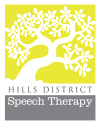At Hills District Speech Therapy, our Speech Pathologists demonstrate exceptional competency in adult speech pathology practice for both ongoing developmental and acquired disorders in the following areas. Click on the hyperlinks to learn more about each area and the approaches we use at HDST.
LANGUAGE
We work in assessing, managing and treating delays/disorders and acquired difficulties (e.g. Aphasia) in areas including:
- Expressive Language (impaired use of language)
- Receptive Language (impaired understanding of language)
- Literacy
- Written Communication
- Social Communication
- High Level Language
- Cognition (including attention, memory and executive functioning)
SPEECH
We work in assessing, managing and treating delays/disorders in areas including:
- Residual Articulation and Phonological Disorders
- Motor speech disorders (including Dysarthria and Apraxia)
- Speech sound disorders with a structural basis
FLUENCY
We assess and assist adult clients in managing their stuttering.
VOICE
We work in assessing, managing and treating voice disorders including adults with Parkinson’s Disease that have difficulties vocalising with adequate loudness.
MULTIMODAL COMMUNICATION
We work in assessing, prescribing and training clients with acquired conditions and disabilities, including Autism Spectrum Disorder, and their carers to use multimodal communication in a range of settings. This includes using:
- Key Word Sign
- Low Tech Augmentative and Alternative Communication options (e.g. communication books)
- High Tech Augmentative and Alternative Communication options (e.g. devices and applications such as LAMP Words For Life)
- Visual supports
SWALLOWING
We provide assessment and management services for adults presenting with swallowing difficulties including:
- Dysphagia (oral, pharyngeal and oesophageal)
- Impaired oral function for eating/drinking
We also work closely with the client, their carer/s and support team to manage and best support their mealtimes.

